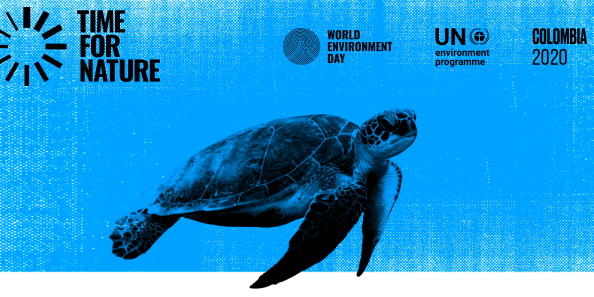World Environment Day is the most renowned day for environmental action. Since 1974, it has been celebrated every year on 5 June; engaging governments, businesses, celebrities and citizens to focus their efforts on a pressing environmental issue.
In 2020, the theme is biodiversity–a concern that is both urgent and existential. Recent events, from bushfires in Brazil, the United States and Australia to locust infestations across East Africa–and now, a global disease pandemic–demonstrate the interdependence of humans and the webs of life in which they exist. Nature is sending us a message.
Above all, World Environment Day offers a global platform for inspiring positive change. It recognizes that global change requires a global community. It pushes for individuals to think about the way they consume; for businesses to develop greener models; for farmers and manufacturers to produce more sustainably; for governments to safeguard wild spaces; for educators to inspire students to live in harmony with the Earth; and for youth to become fierce gatekeepers of a green future. It requires all of us.
BIODIVERSITY
Biodiversity describes the variety of life on Earth, including the 8 million plant and animal species on the planet, the ecosystems that house them, and the genetic diversity among them.
Biodiversity is a complex, interdependent web, in which each member plays an important role, drawing and contributing in ways that may not even be visible to the eye. The abundant foods we eat, the air we breathe, the water we drink and the weather that makes our planet habitable all come from nature.
Biodiversity is the foundation that supports all life on land and below water. It affects every aspect of human health, providing clean air and water, nutritious foods, scientific understanding and medicine sources, natural disease resistance, and climate change mitigation. Changing or removing one element of this web affects the entire life system and can produce negative consequences. Without nature, life on earth would not be possible.
THE IMPACT OF HUMAN ACTIVITY
Human activities have significantly changed three quarters of land surface and two thirds of ocean area. Between 2010 and 2015 alone, 32 million hectares of forest disappeared; and in the last 150 years, live coral reef cover has been reduced by half. Glacial ice is melting at astonishing rates while ocean acidification grows, threatening the ocean’s productivity. Wildlife species are disappearing tens to hundreds of times faster now than in the past 10 million years; and within the next 10 years, one out of every four known species may have been wiped off the planet.
We are on the verge of a mass extinction; and if we continue on this path, biodiversity loss will have severe implications for humanity, including the collapse of food and health systems.
BIODIVERSITY LOSS AND COVID-19
The emergence of COVID-19 has made it clear that, when we destroy biodiversity, we destroy the system that supports human life. By upsetting the delicate balance of nature–encroaching on wildlife, reducing the genetic diversity within animal populations, causing climate change and extreme weather events–we have created ideal conditions for the spread of viruses between animal and human populations. Nature is sending us a message.
IT’S TIME FOR NATURE
Reversing biodiversity loss is the only way to restore and sustain a healthy planet. This will only be possible when we understand the web of life in which we live and appreciate that it functions as a whole system. It is time to reimagine our relationship with nature and put nature at the heart of our decision-making.
The Convention on Biological Diversity recognizes that biological diversity is critical to a healthy planet. To this end, UNEP and its partners are helping countries them develop their own National Biodiversity Strategic Action Plans. UNEP also supports important knowledge platforms on ecosystems and biodiversity such as Global Forest Watch, the Global Peatlands Initiative and the Interfaith Rainforest Initiative.
BIODIVERSITY IS CRITICAL TO HUMAN DEVELOPMENT AND WELL-BEING
Biodiversity underpins economic prosperity. More than half of global GDP–the equivalent of roughly US$44 trillion–is moderately or highly dependent on nature. Of those living in poverty, more than 70 per cent depends, at least in part, on natural resources to earn their livelihoods, whether through farming, fishing, forestry or other nature-based activities.
Nature is an essential source of many drugs used in modern medicine. Plants, animals and microbes enable medical researchers to understand human physiology and treat diseases. Four billion people rely primarily on natural medicines, and about 70 per cent of cancer drugs are either natural products or synthetic ones, inspired by nature.
Ecosystems regulate the earth’s climate by capturing and storing greenhouse gases. In fact, healthy ecosystems can provide 37 per cent of the mitigation required to limit global temperature rise. Conversely, when we damage ecosystems–from peatlands to mangroves to tropical rainforests–they release carbon, instead of storing it.
Biodiverse ecosystems can help mitigate the impact of natural disasters such as floods, storms, tsunamis, avalanches, landslides and droughts. They can also protect against the spread of disease: where native biodiversity is high, the infection rate for zoonotic diseases, such as COVID-19, is lower.
https://www.worldenvironmentday.global/








